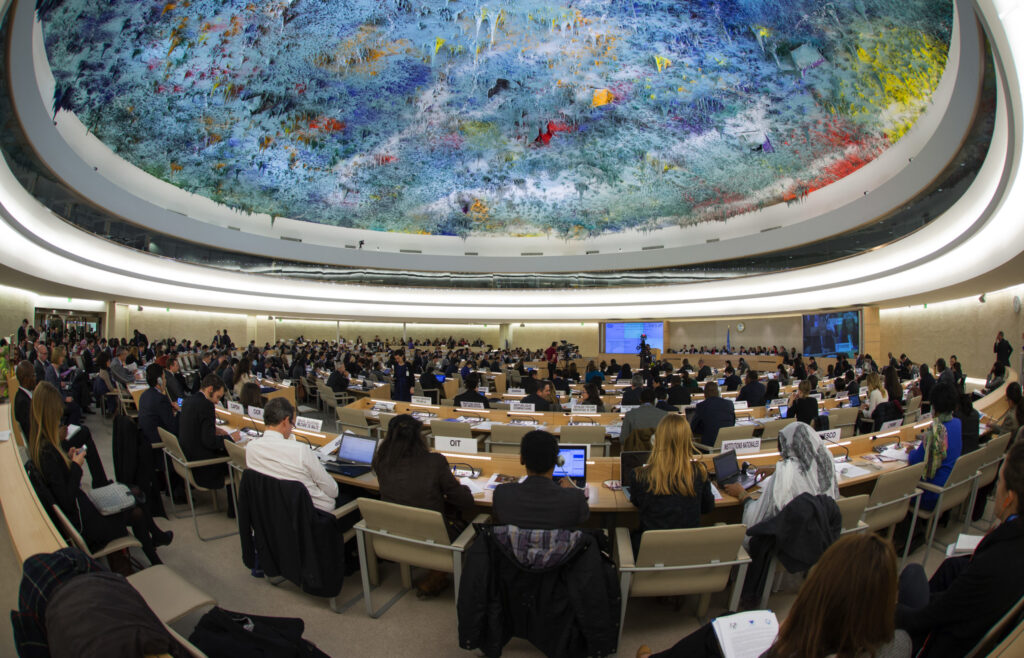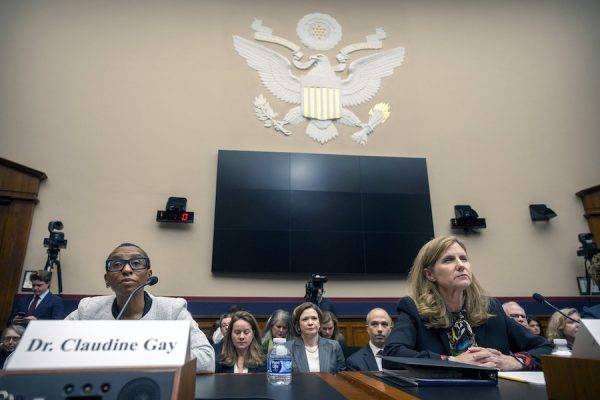In 2017 Senator Bernie Sanders made the Republicans’ tax bill a human rights issue by connecting it to UN Special Rapporteur Philip Alston’s investigation of “extreme poverty” in the United States. Following a meeting with Sanders, Alston castigated the legislation for its potential to exacerbate already historic levels of economic inequality and social immiseration. “Tax policy is human rights policy,” Alston had declared, and the Republican bill represented “America’s bid to become the most unequal society in the world.” In the wake of the finalization of the tax law—arguably one of the greatest tax transfers of wealth to the rich in modern times—activists took up this framing, decrying the human rights implications of the law in creating radical economic disparities.
In the years since the Trump tax legislation took effect, major progressive political figures in the United States have continued to draw rhetorical connections among tax policy, extreme inequality, and human rights. Throughout his 2020 primary campaign, Sanders offered proposals to guarantee housing, medical care, and education “as human rights” and explicitly tied funding of these novel social programs to a wealth tax. Senator Elizabeth Warren and Representative Pramila Jayapal have similarly introduced the Ultra-Millionaire Tax Act aimed at providing funding for public services. And Representative Alexandria Ocasio-Cortez has called for the United States to ratify the International Covenant on Economic, Social, and Cultural Rights as part of her legislative package for “A Just Society.” In making the case for legislative proposals addressing housing justice, immigrant and workers’ rights, and the federal poverty line, Ocasio-Cortez has frequently framed progressive taxation policy as a means to fund programs that would guarantee the rights elaborated in the covenant.
What is at stake in couching these visions of tax policy—a domain often sealed off from larger debates about values—in the language of human rights? On the one hand, it might be thought to deepen the appeal of progressive political programs by highlighting how they aim to improve the basic economic, social, and political needs of their constituents. On the other hand, even as major figures on the U.S. political left mount such arguments, recent critical commentary on human rights evinces a longstanding tradition of skepticism about human rights’ emancipatory potential. Some scholars argue that the simultaneous ascendancy of human rights advocacy and neoliberal governance since the 1970s is far from coincidental and trace how neoliberal reformers often relied upon the language of human rights and its affinity with the self-interested, consumerist individual. Others criticize human rights advocacy for its minimalist vision and lament its compatibility with radical inequality.
This essay is featured in Rethinking Law.
Although this legacy of left skepticism about human rights retains valuable lessons for advocates, our political moment also provides opportunities for the reconceptualization and radicalization of human rights programs. Contemporary appeals to human rights arguably have the most to offer by developing a more egalitarian dimension to the politics of human rights. The traditional liberal conception of human rights as individual entitlements limits the capacity of the state to regulate private power and mobilizes state authority on behalf of private property and capital accumulation. By contrast, progressive appeals to human rights can link this language to a normative vision for a more just social order and the provision of public welfare. Developing an egalitarian vision requires moving beyond a guarantee of sufficient minimums and instead emphasizing how radical social and economic inequality stifle the realization of a more robust and radical human rights project.
Since at least Karl Marx’s famous 1844 commentary on the French Declaration of the Rights of Man and of the Citizen, many left thinkers have been suspicious of the conceptual foundation and practical implications of human rights. As Marx saw it, the declaration underwrote a regime of private property that stifled “genuine human emancipation” while simultaneously absolving the state from addressing social and economic domination in the sphere of “civil society.” On this account, just as the state proclaims the formal equality of all persons, it simultaneously abdicates responsibility for private forms of discrimination and social domination. (Rights to private property and free trade offer no comfort to those without food, shelter, or housing.) Worse still, the imagined subject of rights was, for Marx, nothing other than the self-interested “egoistic” bourgeois whose “liberty” to engage in trade, contract, and property acquisition would be secured at precisely the same time that the social and communal aspects of human social life would be denied.
More generally, critics have long observed that a narrow focus on “rights talk” and formal equality can obscure and even ratify substantive inequalities. Early writings of the Critical Legal Studies movement, for example, contended that the promulgation of legal rights can exacerbate conditions of oppression. In their edited volume Left Legalism/Left Critique (2002), political theorist Wendy Brown and legal scholar Janet Halley noted that “for all the content they may be given by their location in liberal orders,” rights “retain a certain formality and emptiness which allow them to be deployed and redeployed by different political contestants”—including those staunchly opposed to economic redistribution. In similar fashion, contemporary scholars observe how rights claims are invoked to prevent the redistributive taxation of privately held capital, to protect the rights of corporate entities to “speak” as in Citizens United, and to weaken the power of labor unions with “right to work” laws. In his recent book How Rights Went Wrong: Why Our Obsession with Rights Is Tearing America Apart (2021), legal scholar Jamal Greene laments how “American courts draw firm lines, often in morally arbitrary ways, between the interests they consider rights and those they don’t.”
Two contemporary trends in the left criticism of human rights are particularly notable. First, historian Samuel Moyn has argued that human rights advocacy has, in practice, been limited to a minimalist agenda that remains indifferent to the development of extreme inequality. On this account, human rights movements have focused on only the most extreme abuses of state violence and—at best—contemplated guaranteeing a set of minimal social and economic “floor conditions.” “Even perfectly realized human rights are compatible with radical inequality,” Moyn argues. As a result of their indifference to inequality, Moyn despairs that human rights movements and legal regimes proved to be “helpless bystanders of market fundamentalism.”
Second, other critics have observed an essential affinity between human rights projects and neoliberalism. Decades ago, anthropologist Talal Asad suggested that “the historical convergence of human rights and neoliberalism may not be purely accidental,” since human rights notions of “self-ownership” and “self-preservation” align with neoliberal economics’ understanding of human beings as pieces of “human capital” always striving for greater self-augmentation. Critics worry that the legal protections offered by a theory of human rights predicated on a consumerist subject will focus primarily on creation of “free markets” and justify policies that intensify social and economic stratification. Left critics of human rights also observe that different rights regimes encourage and produce particular self-conception among rights holders: if a human right to private property or wealth accumulation is enshrined in law, it helps establish a framework for how people evaluate their life projects.
Recent work by Jessica Whyte and Quinn Slobodian advances this argument and showcases how neoliberal reformers often relied on the language of human rights as part of their own political programs. In Globalists: The End of Empire and Birth of Neoliberalism (2018), Slobodian shows how Geneva School neoliberals who were instrumental in the development of postwar international institutions—such as Ludwig von Mises, Fredrich Hayek, and Wilhelm Röpke—framed human rights as “xenos rights,” that is, rights of security for foreign capital and protections of private property against state expropriation. In addition, Whyte’s 2019 book The Morals of Market: Human Rights and the Rise of Neoliberalism shows how “neoliberals developed their own account of human rights as moral and legal supports for a liberal market order.” As Whyte documents, neoliberals relied on human rights to advance a consumerist vision of the welfare state subject to means-testing and compatible with international human rights instruments. They appealed to human rights as reason to oppose postcolonial projects of economic redistribution and industry nationalization, including notably opposition to the New International Economic Order. And they turned to human rights as justification for radical programs of reform in Chile and elsewhere that focused on privatization, deregulation of financial markets, and destruction of labor unions.
Taking these critiques seriously raises the concern that contemporary progressive appeals to human rights—even if they result in formal recognition of new rights—may prove ineffectual at achieving meaningful social transformation or even actively obstructionist or distracting. Might a narrow focus on securing human rights result in a limited set of reforms to secure minimal sets of goods for the worst-off, while remaining indifferent to the pernicious effects of radical economic inequalities? Or, perhaps worse yet, does the framing of progressive policy goals in terms of human rights leave those programs open to easy cooptation by neoliberal reformers who see human rights as compatible with their own vision of market fundamentalism?
We should not deny the purchase of these critiques, but it is important to see what is potentially distinctive about new appeals to human rights as part of progressive policy. For one thing, the growing contemporary focus on the social and economic dimensions of human rights already helps recast them in ways that depart from neoliberal formulations. We should take the occasion of progressive appeals to human rights as an opportunity for rights’ reinvention—for explaining why, in the context of progressive advocacy, human rights ought to entail a more egalitarian and redistributive political program.
In fact, the tax focus of Sanders, Warren, Ocasio-Cortez, Jayapal, and others is part of a broader progressive shift toward taking social and economic rights seriously. In the wake of both the 2008 global financial crisis and the ascendance of far-right political forces, across the left political spectrum different actors have increasingly emphasized the significance of social and economic rights as a means of addressing widespread social turmoil. Progressives now regularly refer to health care, housing, and education as human rights. Sanders, for example, has explicitly called for a “Twenty-First Century Economic Bill of Rights,” which would establish a living wage, quality health care, complete education, affordable housing, clean environment, and secure retirement as human rights. These political invocations of social and economic rights owe much to the work of social movements. From the early days of the Occupy assemblies to the rhetoric of Black Lives Matter leaders, post–financial crisis social movements within the United States have turned to the language of human rights to make demands for domestic social and political transformation.
As Alston’s case makes clear, a turn to social and economic rights has also been witnessed at the level of more traditional international human rights institutions over the past decade. In a June 2016 address to the UN’s Human Rights Council, Alston underscored that UN human rights organs and transnational NGOs had historically treated economic and social rights, in particular, as “marginal.” Alston shares with human rights skeptics a deep concern about how inequality within states has intensified under conditions of economic globalization, financial market deregulation, and trade liberalization since the 1970s. As he put it in 2016, “the winds of globalization are blowing in directions that are not at all favourable to” economic and social rights. Alston’s far-reaching work with the United Nations between 2014 and 2020 helped reorient human rights advocacy toward social and economic rights in such domains as tax policy, financial regulation, social welfare protections, antidiscrimination, and universal basic income. This project might thus be read as acknowledging some core insights of human rights skepticism while attempting to rectify the failings of human rights through a revitalizing of existing legal instruments such as the International Labour Organization’s Indigenous and Tribal Peoples Convention and the International Convention on the Elimination of Forms of Racial Discrimination.
In these cases, Alston aims to show how existing human rights could be interpreted to necessitate more aggressive political programs of redistribution.
In this regard it seems essential to note that in some respects, the substantive content of rights claims championed by recent progressive political actors differ dramatically from the rights preferred by neoliberal reformers. Human rights to education, housing, protection from racial discrimination, gender equality, union membership, sustenance, and water all emerged over the course of the twentieth century, and new rights instruments and declarations were often developed in response to the demands of left social movements. As scholars such as Stefan-Ludwig Hoffmann have documented the history of international human rights law is complex and polyvalent: within the twentieth century alone, socialist, post-colonial, and other left critics of neoliberalism have, at times, relied on human rights as part of their own vocabularies of justice. From Ernst Bloch’s arguments that only socialism could properly realize the promise of human rights to Malcolm X’s claim that human rights were a superior alternative to civil rights for holding Western government’s accountable for the legacy of racism, numerous radical thinkers have relied on the language of human rights. In this sense, the progressive turn to a more robust vision of social and economic rights language might be seen as an attempt to resuscitate a more radical tradition of human rights advocacy as an alternative to mainstream liberal and neoliberal formations. This work requires recognizing the plasticity of law and its potential to develop in new directions. This does not mean we should fall prey to what international law scholar Susan Marks has called “false contingency” regarding rights—that is, the assumption that human rights are infinitely malleable and repurposable for left politics. But in the twenty-first century context of extreme economic inequality, claims that there are human rights to food, water, non-discrimination, housing, and labor protections may prove more protean and radical than previously imagined.
Even granting these possibilities, however, it isn’t obvious that simply focusing on social and economic rights responds to the most fundamental insights of left critiques. Consider first the objection that, even when successfully enshrined in law and ensured by states, human rights set minimums but largely ignore radical economic inequality per se by attending more to conditions of absolute material deprivation and oppression rather than the relative disparities in power. Perhaps a right to adequate housing for all still says little about the apparent injustice of a social order where millions live in meager one-room homes while a class of billionaires occupies palatial mansions. We might query whether human rights only speak to distributive justice as a matter of contingency: When basic social and economic rights are not protected in a social order with vast disparities in wealth, do human rights principles only demand that redistribution occur to the point where rights are minimally satisfied? Worse yet, do rights claims then risk serving as an apology for a “minimalist justice” that could blunt demands for more radical social transformation? And if progressive appeals to human rights remain confined in this way, are they really so incompatible with the neoliberal vision of rights that can justify programs of privatization and deregulation?
In this sense, critiques of human rights call our attention to the importance of developing a more radically egalitarian vision of human rights advocacy. Egalitarianism, in this sense, should not be construed as merely a matter of formal equality before the law: the insistence, say, that all members of a polity have “equal rights” in the sense of equal claim to a minimal set of rights claims. Rather, a genuinely egalitarian politics of human rights should underscore the ways that radical social, economic, and political inequality necessarily enable widespread violations of human rights. This is not only because, practically speaking, the concentration of private wealth makes it difficult to achieve even the minimum guarantees of basic economic and social rights. Extreme inequalities in wealth also create disparities in political power and fundamentally undermine democratic control over economic governance. Radical inequality thus undermines human rights because it stifles even the basic right to equal say in the democratic political process that ought to determine what social and economic orders reign.
Consider, for instance, how human rights advocates have argued that the “interconnectedness” of different kinds of human rights necessarily implicates inequality. In a 2016 address, Alston invoked the 1993 Vienna Declaration to make this point: “all human rights are universal, indivisible and interdependent and interrelated. The international community must treat human rights globally in a fair and equal manner, on the same footing, and with the same emphasis.” A recurrent theme of Alston’s work is that inequality and extreme poverty impair one’s ability to enjoy almost all human rights. In this sense, it can be cast as a revival of arguments associated with traditions of socialist political theory and welfare liberalism that view material well-being as a prerequisite for active participation in political life. In the United States, this tradition draws inspiration from Franklin D. Roosevelt’s call in 1944 for a “second Bill of Rights under which a new basis of security and prosperity can be established for all” and its role as an antecedent to various articulations of welfarism.
Writers in these traditions have long underscored that conditions of economic precarity—for instance, lack of reliable access to housing, food, water, or medical care—can make political participation and cultural expression nearly impossible. In this regard, we might develop Alston’s arguments about interconnectedness further and insist that extreme forms of inequality are in themselves antithetical to human rights: when material disparities in economic and social resources are substantial, the economically powerful may prevent others from exercising political and civil rights as well. At the very least, this argument suggests that both theorists and advocates ought to reassess the multiple dimensions on which inequality implicates human rights.
Recent progressive takes on tax policy are particularly interesting examples of how one might develop such an egalitarian account of human rights. As a matter of political rhetoric, progressive politicians have framed their tax proposals specifically as a reaction to both insufficient minimums and to radical economic inequality. Moreover, in a substantial sense these programs have an inherently egalitarian dimension: reducing the holdings of the wealthiest (while either not decreasing or increasing the wealth of those with fewer resources) reduces economic inequality. Framing progressive taxation as a human rights issue then implies an affinity between realizing human rights and securing a more egalitarian social order.
More specifically, one might think of the egalitarian connection between human rights and progressive tax policy along three dimensions.
First, and most obviously, progressives argue that taxation can enable the provision of social goods that create a more egalitarian society. If rights to health care, education, housing, and a clean environment entail such social programs as universal health care, affordable housing, and equitable public education (both K–12 and postsecondary), then they also entail a robustly egalitarian tax policy. The progressive vision for these programs entails far more than providing minimums for the worst-off: more fundamentally, by providing robust public alternatives to private provision of essential goods, progressive policies challenge the market-driven approach of neoliberal political economy.
Second, progressive tax policy is egalitarian because it can lessen disparities in political power. In line with Alston’s discussion of the “interconnectedness” of human rights, progressive tax policy focusing on eliminating extreme wealth disparities may limit the ability of the extremely wealth to exercise influence over politics. If campaign finance laws once aimed at creating an equal playing field, so too can limiting the overall wealth of individuals curtail political influence. Progressive tax policies and other programs that restrict “dark money,” eliminate politicians’ ability to trade stocks, and limit corporate funding of political campaigns all aim to prevent powerful actors from crowding out other voices. In this sense, progressive tax policy supports an egalitarian vision of human rights along the lines of the expansive articulation of the interconnectedness thesis: policies that curb the influence of the economically powerful allow for a more egalitarian exercise of political and civil rights.
Third, an egalitarian account of human rights clarifies how conservative and neoliberal tax policy leads to human rights violations. Consider how advocacy along these lines might have taken shape if applied to the 2018 Trump tax legislation. Framing different features of the law as a “human rights” violations can illuminate some of their most pernicious dimensions: the initial House bill’s tax of graduate students “ghost tuition” could have been framed as an attack on the human right to education by depriving all but the wealthiest of access to graduate degrees; the repeal of the ACA individual mandate was in fact framed by some as a violation of the human right to health care; and the elimination of state tax deductions could have be articulated as an assault on the human right to housing. When framed as human rights violations, arcane and technical tax proposals appear politically salient and imperative. A human rights analysis, in short, highlights how law and policy implicate fundamental freedoms and human needs.
Although this analysis offers only a cursory outline of possible lines of argument, it suggests what might also be gained by linking progressive policy programs to egalitarian accounts of human rights. Against the backdrop of rising far-right political forces, social disintegration, and inequities laid bare by the pandemic years, progressive political actors and social movements concerned about inequality are engaged in evolving practices of advocacy, experimentation, and dissident protest. In the United States, in particular, a vast array of political energies and institutional resources that previously supported “international” human rights movements now increasingly find their attention focused on domestic abuses of human rights. The convergence of these energies with renewed focuses on progressive economic and social policy may yet provide new opportunities—both theoretical and strategic—for egalitarian advocates to realize a more robust vision of human rights.









